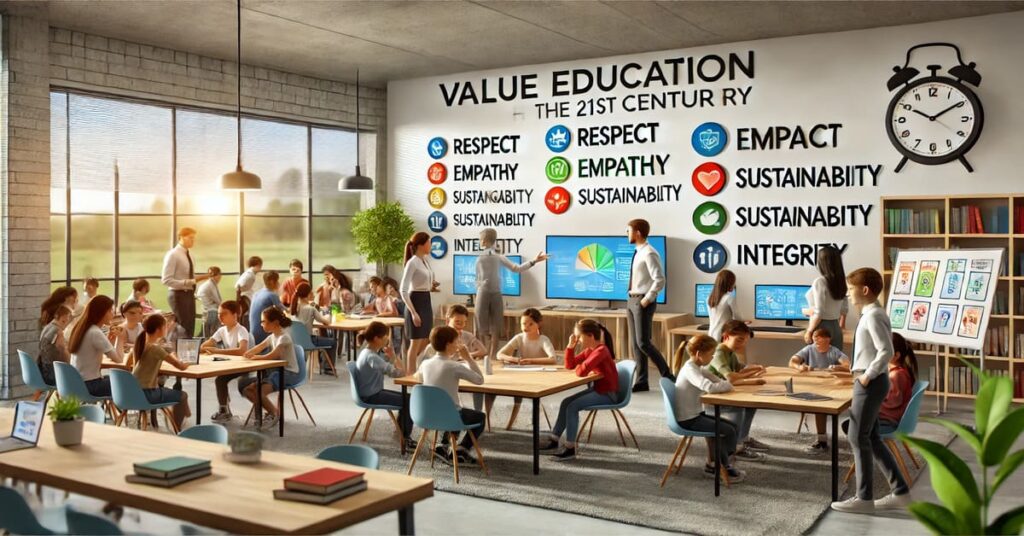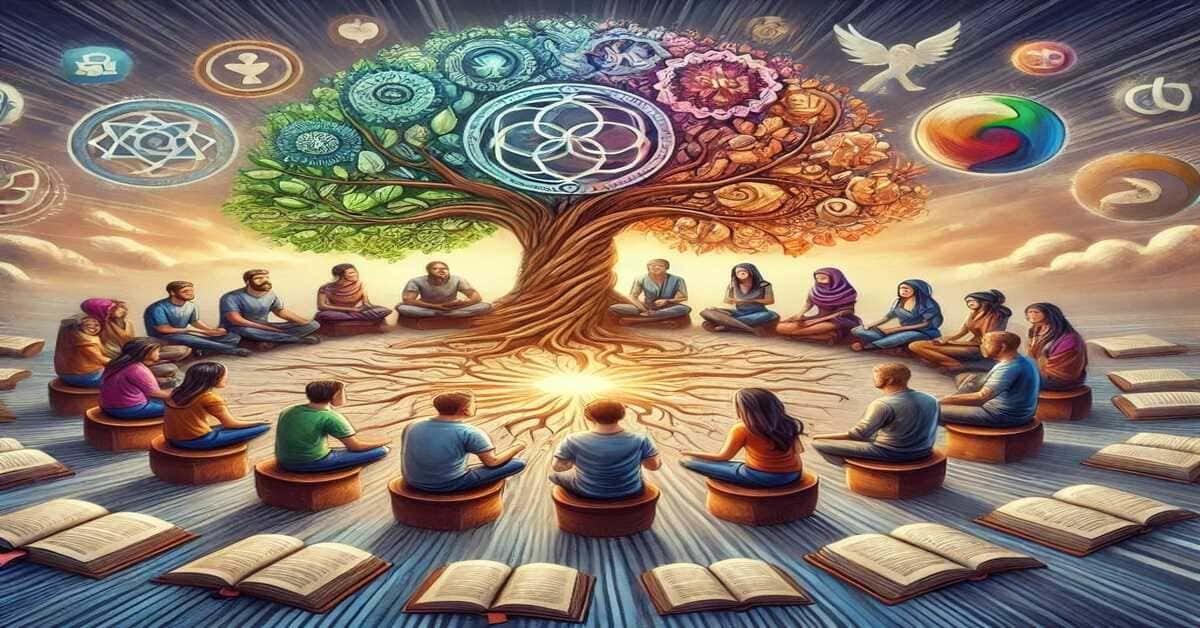Whenever we think about Education, the first picture comes into our mind is School or maybe College, but not the Value Education. If we think, out of the picture, and look at education with the perspective of society, then we will find Two types of Education; first one is “Education of Society” and second one is “Education for Society”. The second one will be considered as Value Education.
Education of Society
This concept has a very broader view of Education. It Includes all the disciplines which tries to develop an Individual with particular skills, knowledge, factual information and many more. So, we can say that, this is individual centric education.
Here, individuals learn about society. For example, a child learns subtraction of mathematics in school. Subtraction is a well developed concept in society, it has specific rules to perform a subtraction. The child has to learn all the rules of subtraction.
Likewise learning of Culture, Religion, Mathematics, Science, Social Science, laws all comes under Education of Society not under Value Education.
Read about Relationship Between Philosophy and Education
Education Of High Value
It also comes under the first type of education which is “Education Of Society”, but education of high value drives you towards Value Education. So, we can say that it is the prerequisite for Value Education. Without this Value Education will just remain a Rote Learning.
In this type of education Individual Develops its own capabilities. These Capabilities are :-
Creativity
It is the ability to generate new Ideas, concepts by thinking out of the box. It is a product of Imagination where things or situations are connected in such a way that, earlier no one was able to do this.
Innovation
When Creativity Converts into Things, Theory, Theorem or Law then it will be considered as innovation. So, Innovation is a product of Creativity, without Creativity Innovation is not possible.
Empirical Understanding
Empirical Understanding can also be termed as Factual understanding. Here results are not just drawn with the help of Theory or logic. But an individual’s experience, observation and experimentation plays an important role in the generation of Knowledge or Comprehension.
Critical thinking
Critical thinking is all about checking Reliability and Validity of the fact. Execution of analysis, evaluation and interpretation in a clear and logical manner will give us proof of reliability and validity. The most important part of critical thinking is “Asking Questions”. It draws an individual from faith towards belief.
Objectivity Vs Subjectivity
On one hand Objectivity is the presentation of self, as a fact, without any influence of others or any situation. On other hand Subjectivity is about opinion or an open ended answer. Objectivity helps us in single ended solutions and Subjectivity helps us in situations like Dilemma.
For example, a group of soldiers are facing a terrorist attack; Objectivity will tell them to kill and win. If terrorists have captured some hostages; then subjectivity comes into the picture because soldiers are in a dilemma.
Value Education as Education for Society
Society educated you and taught you different elements of itself. Education for Society means, the Education that delivers back to the society not in the form of only cash but kind. The Education that teaches you to think out of individualism, and develop compassion towards humanity and nature is known as Value Education.
Few Elements of Value Education:-
Knowledge of Values
Values are the intangible elements which guide the behaviors, attitude and decision making of an individual. There are some core values like honesty, responsibility, compassion etc. There are some values that attach to particular institutions like Cultural values, Social values, Personal values, Organizational values, Professional values etc.
It is important for society that its members have these elements and they should be able to introspect themself.
Emotional Intelligence
Here two emotions are involved: First, the knowledge of self emotions and second one is the knowledge of emotions of the subject group. Use of this knowledge to maximize the betterment of the society is known as emotional intelligence.
Psychologists Daniel Goleman and Peter Salovey divided Emotional Intelligence into five key components: 1) Self-Awareness 2) Motivation 3) Self-Regulation 4) Empathy 5) Social Skills.
Social Responsibility
There are two Phrases: first, Man is a social animal; Second, Power comes with responsibility.Social responsibility is something a mixture of both.
Here, social responsibility means the obligations on the social individual of the institutions they belong to and to maintain harmony with other institutions. Responsibility involves prioritizing the motives of sustainability, accountability and fairness.
There are some institution specific social responsibilities like environmental responsibility, justice and human rights, ethical business practices etc.
Morality
It is the ability of an individual to distinguish and choose between right and wrong or between just or unjust. Morality defines the individual’s perspective of the subject. For example, during the 19th century Sati-Pratha has a significance in the form of cultural value; on the other hand it is Raja Ram Mohan Roy’s moral competence that defines Sati-Pratha as unjust.
Philosophically it can be understood in many ways; Deontological ethics (Kant) argue the importance of Means rather than Outcome. In contrast, Consequentialist theories (like utilitarianism from Bentham and Mill), they give importance to End Result; it doesn’t matter how immoral the means is.
Character Development
Value education concentrates on the development of the character of an individual. If above discussed elements are properly enshrined into the individual, then its character can be considered as developed.
It is not an end result, but a process. Because “life may end but learning doesn’t”.
Importance of Value Education in Changing World

Value Education is not a thing which loses its importance with the passage of time. There are two types of values, if we look at it from the perspective of time.
- The values connected with the tangible things.
- The values themselves, which are intangible and Universal.
With the differentiation you can assume that, with the perspective of time values assigned to a particular tangible thing, it loses its value. For example, if we talk about religion, where things are treated as sacred. Like various sculptures of Harappan civilization, they may have value as sacred but now they are just sculptures.
On the other hand the second categories of values like Humanity, compassion, morality etc. which cannot lose their value. There may be some situations where these can be compromised. Like War, terrorism, defence etc. but these values always have the potential to regain their positions.
21st Century and Values
With the passage of time we lose some values like cultural value, regional value, religious values, national and international values on the other hand we gain values like Globalization, Internet, technology associated values etc.
These are the values which are automatically inputted among the people of the world. As the values we learn about conformity in the same way deviance is considered as moral. And the deviance which tries to abolish the social construct is not good for society. These are the values of the criminal mindset.
For example, Terrorism, Counterfeiting, Organized crime, Violence, Child Abuse, Cyber crime etc
Conclusion
Value Education is the solution to these problems, which teaches that the end may be important but the means should not be compromised. Value Education talks about the Middle Path of Buddha, Non-Violence of Mahaveer and Tolerance of Hinduism. How we incorporate the new values in the same way we have to make a space for cultural and religious values. Indirectly these institutions hold the right virtue for society.
So, value education is very important to adopt change, to ensure mental health, to promote responsibility and accountability and to Integrate the society.
